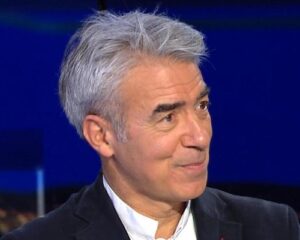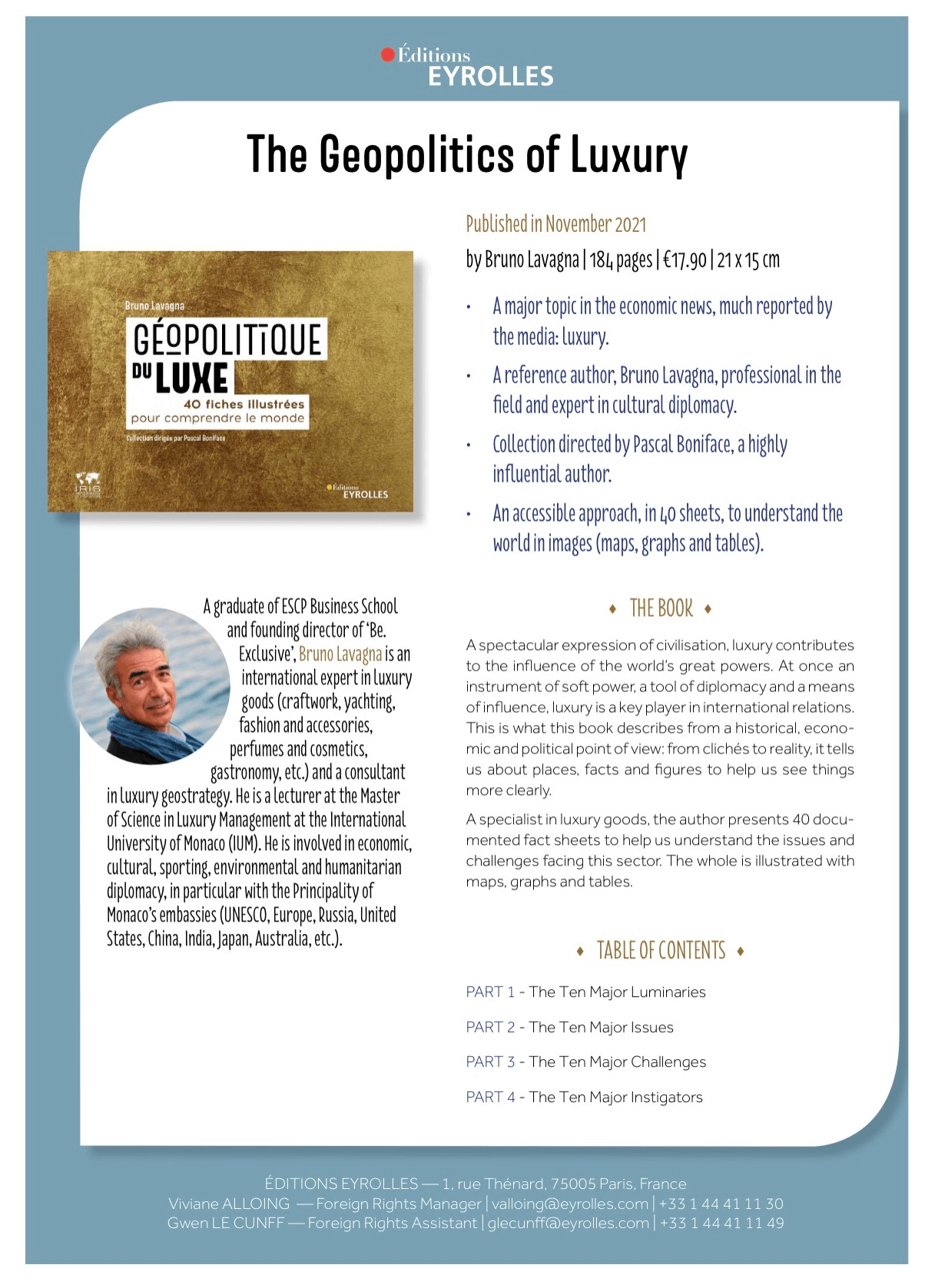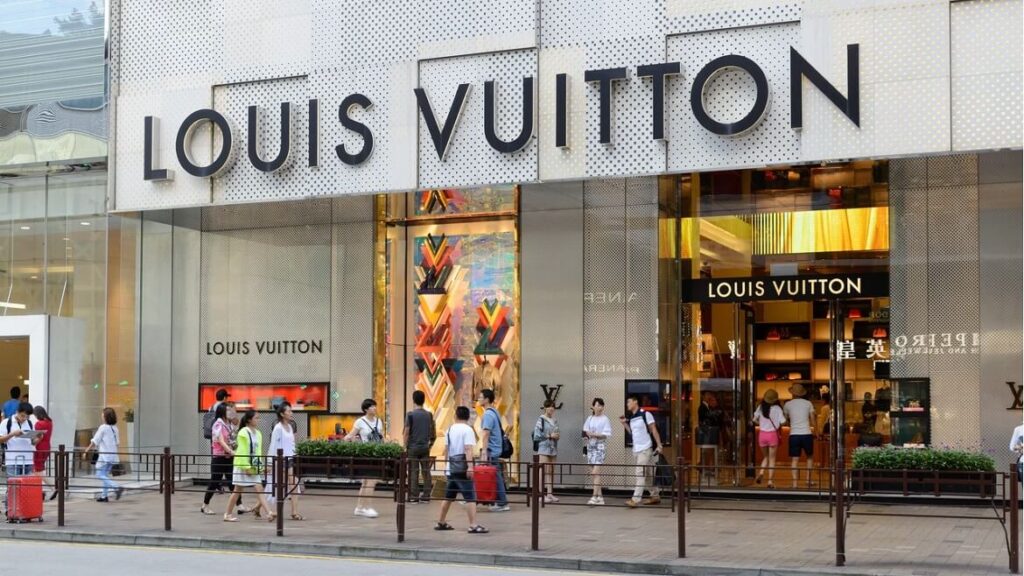World Geostrategic Insights interview with Bruno Lavagna on luxury as a tool for soft power, diplomacy, and international influence.

Bruno Lavagna is a distinguished international expert in luxury products and a consultant in luxury marketing and communication strategies. He is the founder of Be.Exclusive and author of the book “The Geopolitics of Luxury.”
Q1 – In your book you claim that luxury is a real financial powerhouse with an important role on the international stage. Usually geopolitics and luxury are words that are rarely associated. In your book, however, luxury is seen as an important tool of soft power, diplomacy and influence, in essence, as a key player in international relations. How can luxury be defined? How is it related to geopolitics? Why can it be considered a tool of diplomacy and soft power? What role does it play in international relations? How do luxury houses and brands contribute to the international influence of major powers? How do states use their national luxury brands to exert power?
A1- Luxury is an art of living, a state of mind: everyone has his/her own luxury, in all countries/nations.
Luxury can be found in all historical and geographical contexts: it stems from a nation’s geopolitical desire to showcase its best talents and expertise, backed by a strong government eager to promote the nation’s know-how and proud to use it as soft power, a power to influence, an invitation to discover its wonderful heritage.
By way of example, France is one of the leading countries where the luxury trade has been very much alive for years – especially since King Louis XIV and his finance minister Colbert set out to make France one of the most brilliant kingdoms: in architecture with Versailles (inspired by Italian designers), gastronomy and the “art of the table” (as Talleyrand said to Napoleon “give me good meals, I’ll underwrite good contracts for you!”) clothing (birth of Haute Couture), jewelry (the iconic royal diadem of the French Empire), watches, perfumes, cars, yachting. All sectors are involved, even culture (opera) and sport (horse-riding, sailing, motor racing, etc.), and religion (Christianity, Islam, Judaism, Hinduism, Buddhism, Confucianism…).
The same goes for the British Empire and the Commonwealth, Italy and the Altagamma Foundation, Japan and Living Treasures, India and its incredible secrets, and so on.
Luxury is totally tied to geopolitics, because in order to create innovation, human beings need security, educational and health systems, and of course the ability to live in dignity, to eat, drink …. and house. The role of the state is to provide an appropriate and healthy environment with goals tailored to the political issues.
On the other hand, because everyone loves luxury, it encourages compromise, consensus, and diplomacy, because of its roots in diversity, inclusiveness, culture and mixed exchanges.
All nations, monarchies, principalities and democratic republics, have understood the power of luxury and used it as a powerful tool in international relations.
Q2 – In your book you state that luxury influences but also depends on geopolitics. Indeed, as one example, following the conflict in Ukraine different luxury brands closed their operations in Russia. The world is currently in the midst of a geopolitical turbulence, resulting from the war in Ukraine, the China-United States clash, the slowdown of globalization, and possible emergence of different areas of international trade, how does it affect the prospects of the luxury industry?
A2 – Luxury is resilient; it lasts forever. During political conflicts, natural disasters, pandemics, luxury declines, no one wants to buy or donate, but as soon as it ends, human beings need to buy again, what in sociology is called the revenge buying act / compensatory purchase.
Luxury goods companies are saddened by all kinds of human catastrophes and want to show their compassion for the nation, the people, their customers or potential members. They closed their stores in Russia because of the Russian attack on Ukraine. During the Covid pandemic, luxury brands helped with their international logistics networks to facilitate the distribution of hydroalcoholic masks or gels, such as Kering, Hermès, L’Oréal LVMH (the famous KHOL), not forgetting Chanel.
Q3 – In light of some data, luxury is increasingly pointing to the East, not only to China, but also to Japan, South Korea and other countries. What are the current directions and prospects for growth and spread of the global luxury market? It is estimated that in 2025 China will be the largest luxury market, do you think this is a correct forecast?
A3 – Yes, Asia is the upcoming luxury market: China but not only, Japan, South Korea, Singapore are also very stable luxury markets, and new ones are growing, such as Indonesia, Vietnam, Malaysia, and of course India. We can also include the Middle East (KSA, UAE, Qatar), and why not Africa (especially Morocco, Kenya, South Africa, Egypt).
Luxury is part of humanity. It will last forever. It will adapt to socio-economic and political needs and trends.
I teach in several business schools (IFM in Paris, NEOMA in Reims, Skema Sophia Antipolis and Paris, IUM in Monaco, EHL in Lausanne, ISG Luxury in Geneva, ..) that focus on hospitality and luxury: the key factor is to have an open mind, open to the world, to different cultures, without losing one’s identity. For the future international luxury managers, from all countries, the challenge is to innovate while keeping in touch with tradition.
Luxury is dreaming, and realizing the dream.

The book (price 25 euros) can be ordered directly from the author by writing to the following e-mail address: bruno.lavagna@beexclusive.com







